Experiencing a cold can bring more than just a stuffy nose and sore throat. Many people notice an unexpected discomfort pain in their lower teeth.
This type of dental pain can be confusing, especially if you maintain good oral hygiene and haven’t had recent dental issues.
The connection between sinus pressure, upper respiratory infections and oral discomfort often goes unnoticed, yet it’s more common than you might think.
When you’re unwell, inflammation and pressure in your sinuses can radiate downwards, affecting areas like your jaw and even the roots of your teeth.
Understanding why this happens can help you find effective relief and know when to seek professional help.
What’s the Link Between Colds and Tooth Pain?
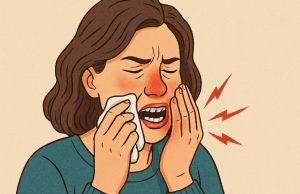
When you catch a cold, your sinuses air-filled spaces located around your nose and forehead can become inflamed and swollen.
This inflammation blocks the normal drainage pathways, causing mucus to build up and increase pressure inside the sinuses. The roots of your upper and lower teeth sit near these sinus cavities, especially the maxillary sinuses, which are situated just above the upper back teeth.
Although the upper teeth are usually closer to these cavities, the nerves that serve your lower teeth are part of the same complex network known as the trigeminal nerve.
This nerve branches across the face and jaw, transmitting pain signals. When sinus pressure builds up, it can trigger nerve responses that cause pain in areas further away from the actual source, including the lower teeth.
This type of referred pain is common and can be surprisingly intense. Even though your teeth may be healthy, the pressure in your sinuses can make them feel sore, tender, or sensitive, especially while chewing or bending over.
Can a Cold Really Cause Lower Tooth Pain?
Yes, a cold can cause pain in your lower teeth, though it’s more common to feel it in your upper teeth due to their closer proximity to the sinuses. Still, the phenomenon of referred pain can explain why your lower teeth may feel sore during a cold.
This referred pain occurs when your brain misinterprets the origin of the pain signal. Even though the discomfort stems from sinus pressure or inflammation, it might be felt in areas connected by the same nerve network.
The trigeminal nerve, responsible for sensation in your face, connects your sinuses, jaw, and teeth.
When sinus tissue becomes inflamed or congested during a cold, the nerve can transmit signals that are experienced as tooth pain sometimes specifically in the lower jaw.
This can be exacerbated by additional cold-related factors like clenching your jaw during sleep, mouth breathing that dries out oral tissues, or general fatigue, all of which can make your lower teeth feel unusually sensitive. It’s not uncommon, and usually temporary, but still uncomfortable.
What Are the Symptoms of Cold-Related Tooth Pain?
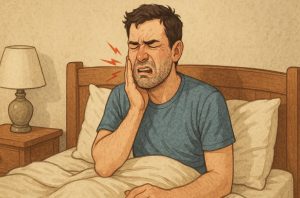
Recognising cold-related tooth pain can help differentiate it from a true dental issue. This discomfort is generally dull, throbbing, or pressure-like and often coincides with other cold symptoms.
You may notice the pain increasing when you bend over, chew, or apply pressure to your jaw or teeth.
Common Signs of Cold-related Tooth Pain
- Pain is spread across multiple teeth rather than isolated to one
- Increased discomfort with sinus congestion or blocked nose
- Dull, persistent ache rather than sharp, localised pain
- Pain eases slightly with decongestants or nasal sprays
- Pain worsens when lying down due to sinus pressure shift
Cold-related tooth pain is also often accompanied by:
- Nasal congestion or runny nose
- Facial pressure around the eyes, cheeks or forehead
- Mild headaches or ear discomfort
- General fatigue and cold symptoms
Since the discomfort is linked to your sinus cavities, it may come and go with changes in nasal congestion. The pain may feel like it’s affecting your teeth directly, but usually it’s a referred sensation from surrounding structures affected by the cold.
Why Do My Lower Teeth Hurt When I Have a Cold?
The sensation of lower tooth pain during a cold can be puzzling, especially since most people associate sinus pressure with the upper teeth.
However, referred pain caused by the trigeminal nerve, which serves both upper and lower jaws, explains this sensation. Here’s why this discomfort can occur:
Sinus Pressure
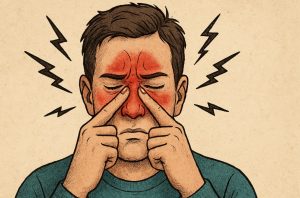
The maxillary sinuses, which are located just above your upper molars, can become inflamed and congested during a cold.
This pressure can extend downwards, affecting the roots of the upper teeth and causing discomfort that can be felt in your lower teeth as well.
Solution: To relieve sinus pressure, try using saline nasal sprays or over-the-counter decongestants to help clear the nasal passages and reduce the pressure in your sinuses. Additionally, applying a warm compress to the affected area may help to alleviate the discomfort.
Inflammation
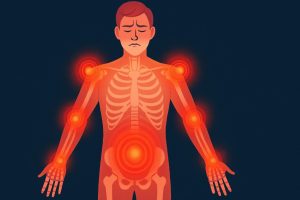
The body’s inflammatory response during a cold can increase sensitivity in various parts of the body, including the teeth and gums.
The swollen tissues around your teeth can make them more sensitive and cause pain, even in the lower teeth.
Solution: Taking anti-inflammatory medications, such as ibuprofen, can help reduce the swelling and alleviate the pain in your teeth and gums. Practicing good oral hygiene is also important during this time to prevent any additional irritation or infection.
Tooth Sensitivity
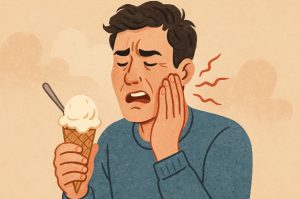
When you have a cold, increased mucus production, as well as exposure to cold air, can heighten the sensitivity of your teeth.
This makes them more susceptible to pain when eating or drinking hot or cold foods and beverages.
Solution: Using toothpaste specifically designed for sensitive teeth can help protect against discomfort. Also, try to avoid consuming extremely hot or cold foods and drinks to minimize the pain caused by temperature changes.
Dry Mouth

Nasal congestion often leads to mouth breathing, which can dry out your mouth. When the mouth lacks sufficient saliva, it becomes more vulnerable to bacteria, making your teeth more prone to sensitivity and pain.
Solution: Staying well-hydrated by drinking plenty of water throughout the day can help keep your mouth moist. Consider using sugar-free lozenges or a saliva-stimulating gel to reduce dryness and protect your teeth from further discomfort.
Referred Pain
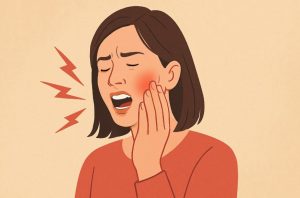
Pain that originates from the upper teeth or sinuses can sometimes be felt in the lower teeth due to nerve pathways.
This phenomenon is known as referred pain, and it can trick your brain into thinking that the pain is coming from the lower teeth when, in fact, it’s stemming from the upper areas.
Solution: Applying a warm compress or a cold pack to the jaw can help reduce the intensity of the referred pain. Gentle massaging of the affected area can also promote circulation and ease the discomfort.
Tooth Grinding (Bruxism)
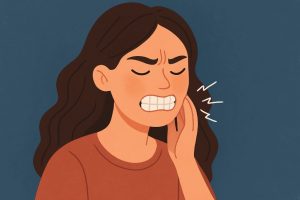
During a cold, people often experience increased stress or discomfort, which can lead to grinding or clenching their teeth, a condition known as bruxism.
This can place extra pressure on the teeth, causing soreness or pain in both the upper and lower teeth.
Solution: If you suspect that you’re grinding your teeth at night, consider using a mouthguard or splint. It can help to protect your teeth from the pressure caused by grinding, reducing pain and preventing further damage.
Weakened Immune System

When your body is fighting off a cold, your immune system may be less effective at combating existing dental issues, such as cavities or gum disease. This can cause these problems to flare up, resulting in pain that may be felt in your lower teeth.
Solution: Maintaining good oral hygiene, including brushing with fluoride toothpaste and flossing daily, can help prevent the worsening of dental issues. If you experience persistent pain, it’s a good idea to consult a dentist for an evaluation.
By understanding these reasons and applying the appropriate solutions, you can better manage the discomfort in your lower teeth during a cold and ease the overall symptoms.
How Can You Tell It’s Not a Dental Problem Instead?
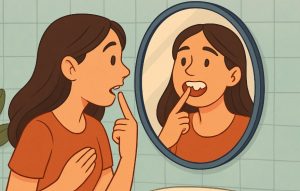
It can be difficult to tell whether your toothache is due to a cold or an underlying dental issue, but certain signs help distinguish the two.
Cold-related tooth pain is often generalised across multiple teeth, particularly in the molars, and typically aligns with other sinus symptoms like congestion and facial pressure.
Differences Between Cold-related Pain and True Dental Issues
- Location: Cold-related pain often affects several teeth, while dental issues usually involve one specific tooth.
- Type of pain: Sinus-related discomfort is dull and constant, whereas cavities or abscesses produce sharp or throbbing pain.
- Other symptoms: Cold-related pain comes with sinus symptoms. Dental infections may involve swelling, gum irritation, or pus.
- Triggers: Dental pain worsens with hot, cold, or sweet foods. Cold-related pain often gets worse when bending forward or lying down.
If your tooth pain improves with cold relief methods such as decongestants or nasal sprays, it’s likely sinus-related.
However, if pain persists after your cold has passed, or is accompanied by visible swelling, pus, or fever, a dental appointment is recommended. A dentist can confirm the source through imaging or examination.
Could Sinus Infections or Congestion Be the Cause?
Sinus infections, or sinusitis, are a common progression from a standard cold and are often responsible for prolonged tooth pain.
When sinuses become infected, the inflammation increases, and thick mucus builds up, exerting significant pressure on the surrounding tissues.
This pressure can extend to the roots of nearby teeth, including both upper and lower molars, through shared nerve pathways.
Even if the infection is limited to the upper sinuses, the pressure can affect the trigeminal nerve, triggering referred pain in your lower jaw. In these cases, the pain often continues even after other cold symptoms have improved.
Sinusitis-related pain may be more persistent and could even feel worse in the mornings due to overnight mucus accumulation.
If you suspect your cold has evolved into a sinus infection especially if accompanied by yellow or green nasal discharge, facial swelling, or a lingering headache it’s important to seek medical attention.
Proper diagnosis and treatment, such as antibiotics or nasal corticosteroids, can relieve both sinus pressure and the associated dental discomfort.
When Should You See a Dentist or GP for Tooth Pain During a Cold?
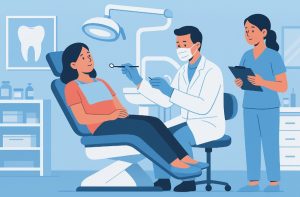
Most cold-related toothaches are temporary and resolve once your congestion clears, but there are situations where professional help is necessary. Knowing when to contact a GP or dentist can help prevent complications.
See Your GP if
- Cold symptoms persist longer than 10 days without improvement.
- You develop facial swelling or redness with discomfort.
- You experience fever alongside tooth pain and chills.
- You notice coloured or thick nasal discharge (green or yellow) worsening.
Contact Your Dentist If
- Tooth pain lasts beyond your cold and worsens gradually.
- Pain is severe or localised to one tooth with throbbing.
- Gums around the tooth are swollen or bleeding excessively.
- There’s visible decay, pus, or sensitivity to food and drink increasing.
It’s also helpful to keep track of when the pain started and whether it changes with your sinus symptoms.
A dentist can take an x-ray to determine if the issue is tooth-related or sinus-based, and your GP can prescribe treatments for sinus infections if necessary. Acting early helps avoid more serious infections or unnecessary procedures.
Can You Prevent Tooth Pain During a Cold or Sinus Infection?
While you can’t always avoid catching a cold, you can take steps to reduce the risk of tooth pain caused by sinus congestion.
Prevention starts with managing nasal health and maintaining strong oral hygiene, especially when you’re feeling under the weather.
Stay well-hydrated to thin mucus and keep sinuses draining properly. Using a humidifier in your home can prevent nasal dryness that leads to blockage. Saline nasal sprays or rinses can help clear your nasal passages and reduce pressure.
Keep brushing and flossing regularly, even if you’re tired or feeling ill. Mouth-breathing, which often happens when you’re congested, can dry out your mouth and increase bacterial growth, so rinse your mouth regularly and consider using an alcohol-free mouthwash.
If you have a history of sinus issues, consider speaking to your GP about long-term prevention strategies.
This might include allergy treatments, nasal sprays, or lifestyle changes to reduce sinus flare-ups. Keeping your sinuses clear is one of the best ways to protect your teeth from referred pain.
Conclusion
Lower tooth pain during a cold is a surprisingly common complaint, but one that can often be traced back to sinus pressure and nerve involvement.
Understanding how your sinus cavities, nerves, and cold symptoms interact can help you find relief and avoid unnecessary dental visits. While the discomfort can be unsettling, most cold-related dental pain resolves on its own as your cold improves.
However, being able to identify warning signs of a true dental issue or sinus infection ensures you get timely care when needed.
By supporting your sinus health and oral hygiene, especially during cold and flu season, you can minimise the risk of developing tooth pain and stay more comfortable while you recover.
Frequently Asked Questions (FAQs)
Can sinus pressure make your lower teeth feel loose or tender?
Yes, sinus pressure can cause referred pain, making your lower teeth feel tender or slightly loose, even if they’re completely healthy.
Do decongestants help reduce tooth pain during a cold?
Yes, decongestants relieve sinus swelling and pressure, which helps ease referred pain affecting your teeth and improves overall comfort.
Is lower tooth pain ever a sign of something more serious during illness?
If the pain persists or is severe and localized, it may indicate a dental issue or a lingering sinus infection.
Should you delay dental treatment if you have a cold?
Unless it’s urgent or causing severe symptoms, it’s best to wait until your cold fully improves.
Can chronic sinusitis cause long-term tooth sensitivity?
Yes, ongoing sinus inflammation can put pressure on dental nerves, leading to long-term sensitivity and occasional discomfort.
What foods or drinks should you avoid when experiencing cold-related tooth pain?
Avoid very hot, cold, or sugary items, as they can irritate sensitive teeth and worsen existing discomfort.
Is it safe to use mouthwash when you have cold symptoms affecting your teeth?
Yes, a gentle, alcohol-free mouthwash can help maintain oral hygiene and reduce harmful bacteria while sick.






